Eggs or Anarchy: The Remarkable Story of the Man Tasked With the Impossible: To Feed a Nation at War by William Sitwell

Author:William Sitwell [Sitwell, William]
Language: eng
Format: epub
Tags: Food, History, Biography, Non-Fiction, War
ISBN: 9781471151088
Google: 4tMaCgAAQBAJ
Amazon: B0112OONF0
Publisher: Simon and Schuster
Published: 2016-06-01T23:00:00+00:00
11
REGULATION AND AUSTERITY
On 21 March 1941 Woolton was summoned to Chequers, the Prime Minister’s rural retreat in Buckinghamshire.
Chequers, a well as being a haven from bomb-torn London, was a refuge from the ration. Churchill, disparaging of the system, thinking it over-complicated and lacking a bit of common sense, liked to base his views on first-hand experience. He had written to Woolton a few days earlier – on 2 March – complaining about a new system of regulating foodstuffs, whereby consumers had to choose between fish or meat. ‘I should have though that an exhortation not to leave anything on the plate, and to take small portions, with, if necessary, a second helping, would be a wise step.’
For Woolton such advice was just Churchillian eccentricity. But clearly that was how Churchill managed his own personal ration. He cleared his plate and then had a second helping if he felt like one. After all there was no lack of food at Chequers or 10 Downing Street. Churchill told his personal staff to write to the Ministry of Food; but not to Woolton. The letters, containing requests for extra ration books, points or whatever was needed, would always be addressed to more junior minions who would not query demands from the Prime Minister.
For example, on 24 June 1940 Churchill’s private secretary John Martin wrote to one R. P. Harvey at the ministry to say: ‘Both at Chequers and at No 10 Downing Street the rationing restrictions make it very difficult to entertain officially to the extent which the Prime Minister finds necessary. Mr Churchill has asked if an arrangement could be made whereby in both instances extra rations could be supplied to cover official guests.’
Likewise in the same month there was a letter from the Downing Street cook, Georgina Landemere, asking for extra ration books. Other staff, such as Kathleen Hill or Elizabeth Layton – assistant private secretaries – wrote frequently during the course of the war to say they had ‘exhausted’ their supplies and to ask for extra coupons for meat and cooking fats and tea as well as cheese and butter vouchers. One private secretary wrote to the Army & Navy Store in London asking for extra sugar for ‘bottling’ at Chequers. Similarly those who had to entertain Churchill – if he was due for a weekend house party, for example, or just coming for lunch – would write to the Ministry of Food.
On 14 November 1940 John Martin put in another request, this time for extra coupons for the chef at Ditchley Park, in Oxfordshire (where Churchill often stayed and sometimes held important meetings).
There is also a record of a telephone conversation between Martin and a ministry official on 20 November 1940, in which the official confirmed that there would be ‘no difficulty’ in using special diplomatic food coupons at places, other than Chequers, where the Prime Minister might spend his weekends. While Britain had to tighten its belt, it seems Churchill merely loosened his.
But Woolton would not raise his eyebrows at the food on offer at Chequers that evening in March 1941.
Download
This site does not store any files on its server. We only index and link to content provided by other sites. Please contact the content providers to delete copyright contents if any and email us, we'll remove relevant links or contents immediately.
| Africa | Americas |
| Arctic & Antarctica | Asia |
| Australia & Oceania | Europe |
| Middle East | Russia |
| United States | World |
| Ancient Civilizations | Military |
| Historical Study & Educational Resources |
Black Genesis by Robert Bauval(1636)
Serpent in Sky by John Anthony West(1057)
The Egyptian Book of the Dead by John Romer(845)
The White Nile by Alan Moorehead(801)
100 Hieroglyphs by Barry Kemp(660)
The Emerald Tablets of Thoth the Atlantean by M. Doreal(636)
Nasser by Saïd K. Aburish(598)
Think Like an Egyptian by Barry Kemp(576)
Legends Of The Gods (Illustrated And Annotated Edition) by E. A. Wallis Budge(575)
Egypt - Culture Smart! The Essential Guide to Customs & Culture by Jailan Zayan(558)
Lost Technologies of Ancient Egypt: Advanced Engineering in the Temples of the Pharaohs by Dunn Christopher(555)
The Ultimate Ambition in the Arts of Erudition by Shihab al-Din al-Nuwayri(537)
Osiris and the Egyptian Resurrection, Vol. 1: 001 by Budge E. A. Wallis(537)
Egyptian Magic (Illustrated And Annotated Edition) by E. A. Wallis Budge(535)
The Ultimate Ambition in the Arts of Erudition by al-Nuwayri Shihab al-Din(512)
A History of the Middle East: Fourth Edition by Peter Mansfield & Nicolas Pelham(498)
Egyptian Myths And Mysteries by Steiner Rudolf(495)
Ancient Egyptian Warfare by Ian Shaw(493)
Ramesses by Joyce Tyldesley(477)
